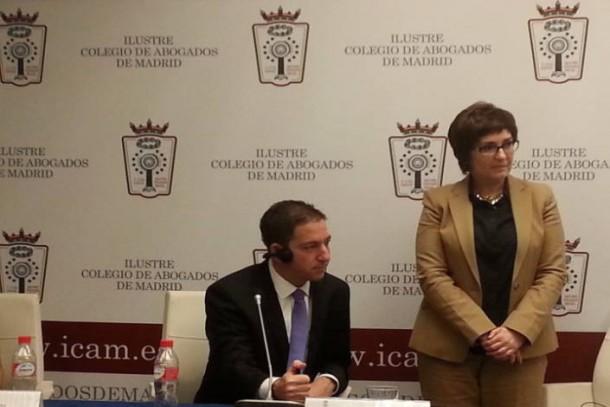MADRID, SPAIN. It is one year ago to the day that reports first appeared in the media detailing classified documents Edward Snowden had obtained while working in an NSA centre in Hawaii. The journalist Glenn Greenwald was instrumental in the release of these documents, meeting with Snowden in Hong Kong to plan their publication and revealing some of them himself in The Guardian. The huge interest that still remains in the case is proof of its impact, as explained by Greenwald himself last week at the Ilustre Colegio de Abogados in Madrid as part of the only conference he will give in Spain during his visit to present his book “No Place to Hide.”
An old library in the Colegio de Abogados was host to Greenwald as he participated in the conference entitled “Privacidad y vigilancia en la Red: El impacto en los derechos civiles del sistema de vigilancia de la NSA” (“Privacy and surveillance on the Internet: the impact of the NSA’s surveillance system on civil rights.”)
At the core of the discussion was Greenwald’s emphasis on privacy as a key civil right. It can be difficult to understand the impact in our day-to-day lives, with some stating that there is no reason to worry if there is nothing to hide. However, the revelation of the extent of the NSA’s surveillance has an impact that goes beyond saving the world from “the bad guys” and has a much deeper impact. As Greenwald states, every individual has something they do not want others to see, whether it is incriminating or not. The fear of being watched severely impacts human freedom in manipulating the behaviour of its citizens. Greenwald emphasises, “Only when we can exist in a world where we are not being watched […] do we really explore the limits of creativity in deciding who we want to be as individuals.” It can lead to complete submission.
Whether one is a supporter of the “nothing to hide” argument,or not, what cannot be disputed is the more significant issue of the targeting of specific nationalities by the NSA, such as the indiscriminate targeting of Brazilians, and the veritably illegal actions undertaken by the NSA to obtain some documents like the phone data programme. The worst, though, is yet to come, says Greenwald.
Not only is the civil right of every individual in danger through the NSA’s actions, the uncertain legal situation of Greenwald due to the Espionage Act of 1917 demonstrates the potential infringement of the First Amendment to the US Constitution guaranteeing a free press. The dissemination of the documents through the press has been crucial in the way the documents and the story have spread. It is only through a free press that such a debate, the first of its kind, has been sparked and placing it in a journalistic context has allowed for a background of understanding for those not aware of the significance of the leaks. The choice of which news organisations released the documents was significant for Snowden, highlights Greenwald, as he made a conscious decision not to involve the US media giant The New York Times due to their close proximity to the US government and the possibility for the government to suppress any compromising information.
Whilst there is no going back in terms of the information that has already been collected, there is a future solution in the form of encryption which blocks even the NSA from accessing details. According to Greenwald, only 10000 individuals currently use this technology, potentially due to its current complicated nature. Though for those in jobs requiring confidentiality, the failure to use encryption is irresponsible, Greenwald states. The future of cryptography is promising, though, as it becomes easier for all to use. Whilst it does act as a brick wall for the NSA, they are still able to find out who is encrypting documents, leading to users being considered as suspicious. It is only through normalisation of the use of encryption that this will no longer happen.
In a poll conducted in 2013, for the first time since 2001, Americans feared the government’s attack on basic rights more than an attack by terrorists. This demonstrates a shift in opinion as the population realises that privacy does matter. Outside the USA, the response of foreign governments, especially regarding the asylum of Edward Snowden, will be a telling indication of other potential action. It is clear, though, that the fear of being watched is animating our world, and the war against surveillance has only just begun.

